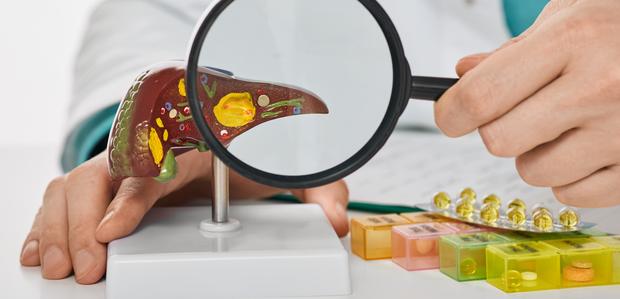Department Of Surgical Gastroenterology

The Department of Surgical Gastroenterology deals with the clinical problems of the digestive tract that need surgical intervention. The department is supported by skilled surgeons, who have specialised in the most modern surgical techniques and clinical practices to deliver the best results to the patients.
In addition to tackling all the common upper GI symptoms caused by Gastro-oesophageal Reflux Disease, Gall Bladder, Pancreas and the Small Bowel, the Department is also equipped to evaluate lower GI symptoms such as constipation and others. It’s one of the few centres in India which has the expertise in performing anorectal manometry and its interpretation to study the whole gut transit time using SITZ markers.
The department provides a multidisciplinary approach to Surgical Gastroenterology.
The team of surgeons possesses extremely competent skills across all forms of surgical treatment with conventional and advanced Laparoscopy methods for patients who require abdominal operations.
The Gleneagles Hospitals have dedicated staff who offer focused care for patients with specific abdominal conditions. The labs, wards, and operation theatres have advanced instruments to provide the patients with the best possible service.
- Weight Reduction Surgeries
- Colorectal Surgery
- Hernia Surgery
- Splenectomy
- Gastric Bypass
- Gastric Banding
Endoscopic Retrograde Cholangiopancreatography (ERCP) is a diagnostic and treatment procedure for bile and pancreatic duct problems. ERCP is suggested if the bile or the pancreatic ducts become blocked or narrowed due to gall stones, infection, chronic pancreatitis, and tumours in the pancreas and bile ducts.
ERCP uses a thin, flexible, optic tube called an Endoscope. Anaesthetic Spray, Gargle, or Lozenge is used to numb the Throat and relax the Gag Reflex. Then, the scope is inserted through the throat and Oesophagus to the point where the bile ducts from the pancreas and gall bladder drain into the duodenum. A catheter is inserted through the scope and a contrast material is injected into the bile and pancreatic ducts. Then, several X-rays were taken simultaneously to view the abnormalities. The doctor may insert small tools which allow for obtaining a tissue sample, opening a blocked or narrowed bile duct, placing a stent, or removing gall stones.
Laparoscopic Cholecystectomy: Cholecystectomy is the removal of the gall bladder. It is indicated in patients with painful gallstones. Laparoscopic gall bladder removal is a minimally invasive procedure where small incisions are made and fine surgical instruments are used to remove the gall bladder.
General Anaesthesia is given before the surgery. A small incision is made in the abdomen and a cannula is inserted. A Laparoscope that consists of a tiny camera is inserted through the cannula to view the internal organs. The surgeon inserts other cannulas to gently separate the gall bladder from its attachments and removes it through the opening. Then the incision is sutured and covered with sterile dressing.
Advanced facilities for Surgical Gastroenterology with excellent diagnosis and affordable cost of stomach disease treatment in India
Gleneagles Hospitals, India is the best Surgical Gastroenterology hospital in India offering the best of treatment and care for all types of Gastroenterological Diseases. Helmed by the top Surgical Gastroenterologists in India, the hospital is recognised for its wide range of Gastroenterological Surgeries & Treatments. The best Surgical Gastroenterology doctors in India working with a dedicated team of nursing professionals bring the best in Surgical Gastroenterology care.
Our Doctors
View all-

Dr Prashanth Rao
Director and Senior Consultant
MBBS, MS, FRCS (Ed), DNB MNAMS, Diploma in Laparoscopic Surgery (Fr.), FIAGES, FALS (Hon), FICS (USA)
-

Dr Rajendra Prasad Bhupathi
Consultant
MBBS, MS, FMAS, DNB (Surgical Gastro, NIMS)
-

Dr Aslam Baba
Consultant
MS (General Surgery), DNB (G.I. Surgery)
Bringing The Latest Technologies From Around The Globe For Accurate Diagnosis And Treatment Of Diseases:
The Department of Surgical Gastroenterology helps patients suffering from Gastroenterological Diseases overcome pain and discomfort using Surgical interventions. The department offers advanced surgical procedures for all Gastroenterological conditions including Bariatric Surgeries, Surgeries for the removal of Polyps, Ulcers and Tumours, and various other conditions. Gleneagles Hospitals has been a pioneer in various Gastroenterological procedures and continues to be a leading hospital in this field. The Department of Surgical Gastroenterology provides treatment and care for the following diseases.
Why Choose Us?
-
PATIENT EXPERIENCE
Your care and comfort are our top priorities. We ensure that the patients are well informed prior to every step we take for their benefit and that their queries are effectively answered.
-
LATEST TECHNOLOGIES
Your care and comfort are our top priorities. We ensure that the patients are well informed prior to every step we take for their benefit and that their queries are effectively answered.
-
PROVIDING QUALITY CARE
Your care and comfort are our top priorities. We ensure that the patients are well informed prior to every step we take for their benefit and that their queries are effectively answered.










